Baku-Tbilisi-Kars railway will enhance connectivity in Eurasia
 |
|
Turkish President Tayyip Erdogan and his Azeri counterpart Ilham Aliyev and Georgian Prime Minister Giorgi Kvirikashvili attend the inauguration ceremony of Baku - Tbilisi - Kars railway in Alyat, Azerbaijan, October 30, 2017.[Photo/Xinhua] |
The South Caucasus region, a land bridge during the ancient Silk Road, is once again eager to play a crucial role connecting China and Europe by heavily investing in a railway which runs between Turkey, Georgia, and Azerbaijan. The region's strategically important location was highlighted during the recent inauguration ceremony of the aforementioned railway.
The Baku-Tbilisi-Kars track, also dubbed the "Iron Silk Road", was inaugurated on November 30, 2017, in Alyat, 70 kilometers southwest of Baku, Azerbaijan. The presidents of Turkey, Azerbaijan; the prime ministers of Georgia, Uzbekistan, Kazakhstan and the ministers of Turkmenistan and Tajikistan attended the ceremony to mark the historic day.
The Baku-Tbilisi-Kars railway project, which has a price tag of $1 billion, was initiated in 2005 and the construction began in 2007. The line will initially be used to transport 1 million passengers and 6.5 million tons of freight a year. In the long term, its capacity is set to reach 17 million tons per year.
Apart from constituting the backbone of the economic corridor between Turkey, Georgia, and Azerbaijan, the Baku-Tbilisi-Kars railway will also increase connectivity across Eurasia and reduce the transport time from China to Western Europe to 15 days from well over a month.
Trains coming from China will enter into Kazakhstan through the Khorgos Gateway, before crossing the Caspian Sea by ferry to reach Azeri capital Baku. From Baku, trains will go through Georgian capital Tbilisi, pass through gauge-changing facilities in the Georgian town of Akhalkalaki and reach Turkish city Kars. Turkey plans to build another high-speed railway line in collaboration with China between Kars and Sivas. Building Kars-Sivas line would enable trains to reach Istanbul and feed into the broader European rail system. This route from China to Europe is called the Middle Corridor, and the Baku-Tbilisi-Kars railway is designed to become a crucial part of the Middle Corridor Initiative which is an essential component of the Belt and Road Initiative. Integration of the Middle Corridor Initiative into the Belt and Road Initiative is the spirit of the Memorandum of Understanding signed in 2015 between Turkey and China on aligning the Belt and Road Initiative and Middle Corridor Initiative.
Tayyip Erdogan, President of the Republic of Turkey, during his visit to Beijing to attend the Belt and Road Forum this May, pledged that as an indispensable participant, Turkey is providing a strong support to the Belt and Road Initiative. To that end, as an important step in the Middle Corridor Initiative, Baku-Tbilisi-Kars railway line is an integral part of the Belt and Road Initiative.
The first test drive on the first half of the Middle Corridor was carried out from Shihezi in the Xinjiang Uygur autonomous region of China. The train, which traveled 3,500 km, reached Baku on August 3, 2015, after a five-day trip. The first freight train that ran on the second part of the Middle Corridor, which is Baku-Tbilisi-Kars railway to Europe, has recently departed from Kostanay region of Kazakhstan. The train followed Baku-Tbilisi-Kars route to reach Mersin Port in Turkey. President of Azerbaijan Ilham Aliyev said at the inauguration ceremony of the BTK that the 826-kilometer railroad is the "shortest and most reliable link between Asia and Europe”.
The operation of the Baku-Tbilisi-Kars railway encourages other states to invest in their railway infrastructure projects to get connected to the Baku-Tbilisi-Kars line which would pave the way to building a more efficient web of transportation in the region. According to Onur Uysal, a Turkish railway consultant, Kazakhstan has just completed a west-east rail connection which may enhance connectivity between Turkey and China via the Caspian Sea. Iran is willing to build a new line to reach Azerbaijan, Georgian Government has stated that it may re-open Sukhumi-Tbilisi railway and Afghanistan has also announced its interest in this project.
The European Union applauded the inauguration of the Baku-Tbilisi-Kars stating that it is "a major step in transport interconnections linking the European Union, Turkey, Georgia, Azerbaijan, and Central Asia”.
According to experts, the importance of the Baku-Tbilisi-Kars railway is difficult to underestimate. First, The Baku-Tbilisi-Kars railway is believed to provide an economic boost to the strategically important South Caucasus region, and it will also be one of the critical parts of the Belt and Road in the wider region of Eurasia. Second, the railway project will enable the countries in South Caucasus to extend their reach to Europe, Central Asia, and China. Third, the region's enhanced connectivity may lead to increased manufacturing capacity.
Increasing number of Chinese firms may get interested in using the Baku-Tbilisi-Kars railway line to transport their products to Europe. And the Baku-Tbilisi-Kars railway might also serve as a new incentive for Turkey and China to cooperate in building the Sivas-Kars railway line which would enable direct connection to Istanbul and feed into the broader European rail network.
The author is a PhD Candidate at the School of International Studies, Peking University.



















